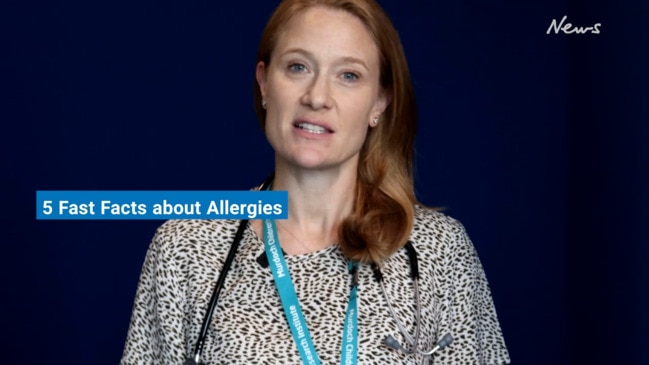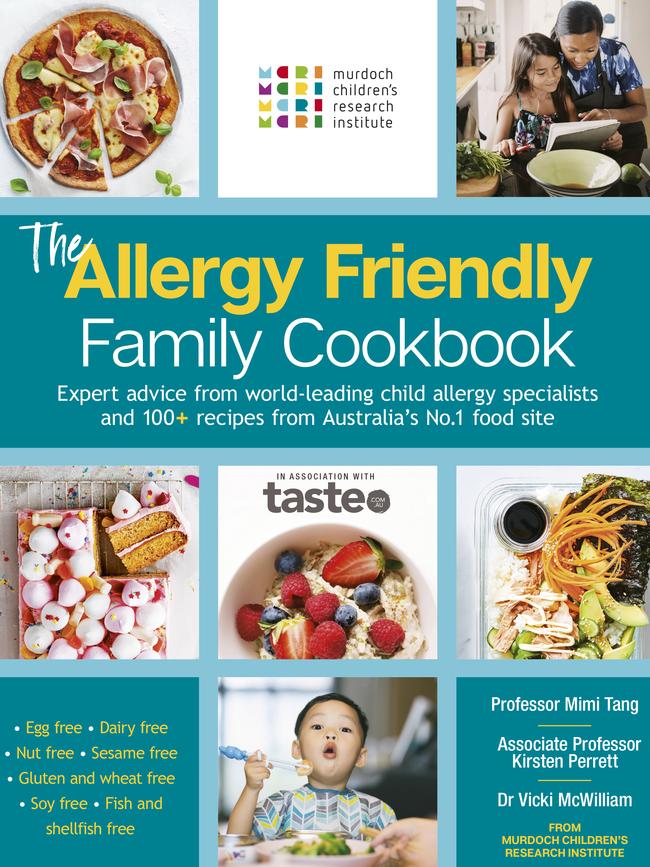How vitamin D and a new cookbook are helping families navigate the food allergies fight
A diet high in vitamin D for pregnant mothers and babies is part of a leading medical team’s vision to see no Australian child go to school with a food allergy.

SmartDaily
Don't miss out on the headlines from SmartDaily. Followed categories will be added to My News.
The role of vitamin D, a diet for pregnant mothers and babies that includes egg and peanut, and the introduction of these allergens in the first year of life are all being investigated by a leading medical team with a vision to see no Australian child go to school with a food allergy.
Associate Professor Kirsten Perrett, Population Allergy Group Leader at the Murdoch Children’s Research Institute, says her team is making “significant inroads” to finding solutions to help combat food allergies, which affect 10 per cent of Australian infants.
Perrett believes Australia’s geographic location, being further away from the equator, is a significant factor and added vitamin D could be a solution.
“Research shows an association between low vitamin D levels and higher rates of food allergy. To find out more, the Murdoch Children’s VITALITY Trial is aiming to determine if vitamin D supplementation in the first year of life leads to a reduction in food allergies.

“We know the immune system is very malleable around that early infant and preschool age and so our program of research is about prevention, how can we intervene during pregnancy, breastfeeding and the early infant period to minimise the risk of a child developing a food allergy. These include different levels of allergenic foods in the diet during pregnancy, skin barrier creams or vaccines in early life along with vitamin supplementation.”
Food allergies occur when the immune system incorrectly mounts an immune response against the food or an allergen which is normally harmless. The five most common food allergens are egg, peanut, tree nuts, cow’s milk and sesame.
Perrett says food allergies have become more common in the past three decades with more children and adults affected than ever before.
“We think environmental factors and the modern lifestyle may be playing a part,” she says. “Things such as the overly-hygienic, clean lifestyle of Australian families, the geographical location of Australia being further away from equator, successful SunSmart campaigns such as “slip slop slap” in the summer months, and no fortification of dairy products with vitamin D leading to vitamin D deficiency may all be contributing to higher rates of food allergy.”

Perrett further explains there are five main risk factors for food allergies. She calls them the 5Ds.
Diet, Dry skin, vitamin D, Dogs (external environmental exposure) and Dribble (gut microbiomes).
“Results of randomised controlled trials show early egg and peanut introduction in the first year of life can be preventative and protective against the development of egg and peanut allergies,” she says.
“Our research shows that peanut and tree nut allergies are more likely to be lifelong with just 30 per cent of children growing out of a peanut allergy by age six as opposed to 90 per cent who will grow out of an egg allergy.”
GROWING INTO ALLERGIES
Perrett says there are still unknowns, particularly around the 1-2 per cent of adults developing allergies.
“Later in life, we know that the immune system shifts towards increased susceptibility to infections or new conditions,” she says.
“You can develop allergies to foods you’ve eaten for many, many years with previously no problems. So further investigation is needed into how and why adults develop food allergies.


FEAR WAS REAL
TV landscaper and former NRL player Dennis Scott remembers the fear when his toddler daughter Poppy first reacted to eating peanuts.
“She was eating a peanut butter sandwich at about three and her lips swelled up instantly. Luckily our neighbour in Brisbane was a nurse and we were recommended to see an allergist and get it tested.”
Poppy, now 14, also discovered during a medical procedure that she has an allergy to iodine, but has thankfully mostly grown out of her earlier severe peanut allergy.
“We had to carry an EpiPen everywhere we went and we were always worried that she would accidentally eat peanuts, but thankfully there were no accidents.”
Scott says having a cookbook like the Allergy-Friendly Family Cookbook would have been handy.
“The more menus and stuff you can have at your disposal as a parent to give you options is definitely a positive.”
HELPING FAMILIES
Perrett is one of the co-authors of a new book trying to help families with food allergies take back control in the kitchen. The Allergy Friendly Family Cookbook has expert advice from world-leading child allergy specialists and more than 100 recipes from Taste.com.au, Australia’s no.1 food site.
Perrett says she wishes the book had of been around when her daughters were allergic to cow’s milk.
“I will never forget living with the anxiety that, at any time, potentially with the next snack or meal, my child might have a severe reaction. Having this book would have made a huge difference with the 100 great recipes and practical advice.”
News Corp Australia community ambassador Penny Fowler says: “We are delighted that our team at Taste has worked with Murdoch Children’s to create this valuable book to give children and their families the certainty that the food they are eating is safe.
“This book will help many Australian households overcome the doubt and uncertainty associated with mealtimes and will mean busy parents no longer have to cook multiple meals – instead, all the family can sit down and enjoy the same thing together.
“News Corp Australia is committed to improving the health and wellbeing of all Australians as seen through our longstanding support for Murdoch Children’s and child health care research,” Fowler says.
* The Allergy-Friendly Family Cookbook, published by Harper Collins, RRP $39.99, is available from Wednesday.


